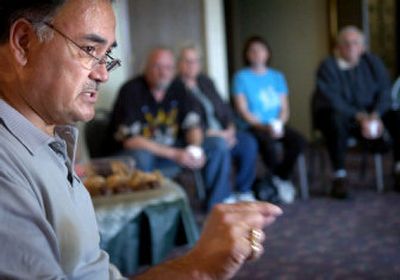Owner blames politics for casino’s demise

CHEWELAH, Wash. – After nearly 20 years of legal battles with state and federal authorities over the right to conduct gambling, one of the state’s oldest Indian-owned casinos has been forced to close by the Spokane Tribal Gaming Commission.
The Oct. 20 closure of the Double Eagle Casino, which has offered gambling on Spokane Indian trust land just south of this Stevens County town since 1986, comes as the tribe seeks approval of a recently negotiated gaming compact with the state of Washington.
The tribe’s action also comes at a time of political strife on the Spokane Reservation, about 50 miles northwest of Spokane, as the Double Eagle’s owner, tribal member Ronald “Buzz” Gutierrez, struggles in Tribal Court to keep his business alive and protect the livelihood of his employees.
“This erratic action put 19 people out of work in Stevens County, and that is economically devastating to the surrounding community of Chewelah,” Gutierrez said, calling the closure of the Double Eagle “the result of tyrants” in tribal government.
The Double Eagle is located on tribal property next door to the tribal-owned Chewelah Casino, which remains open.
In September, Gutierrez filed suit against the tribe for alleged breach of contract after the tribe removed its electronic gaming devices from the Double Eagle. The tribe, through its attorney, has said the lawsuit is without merit and has sought its dismissal, citing sovereign immunity from such litigation.
The lawsuit and Gutierrez’s appeal of the Tribal Gaming Commission’s order closing the Double Eagle are pending in Tribal Court. Gutierrez maintains his casino is a “grandfathered” gaming facility because it was in existence before the 1988 enactment of the federal Indian Gaming Regulatory Act.
Under the act, such individually owned casinos may continue to operate provided they pay 60 percent of net revenue to the tribe and pay an annual assessment to the National Indian Gaming Commission, which regulates tribal gambling. Over the past 12 years, the Double Eagle has raised $25 million for the tribe, Gutierrez said.
After the tribe pulled its 250 “slot machines” out of the casino in September, Gutierrez leased and installed 104 Class II electronic devices, which simulate bingo. In its Oct. 18 order to close the Double Eagle, the Tribal Gaming Commission said those devices were installed without its approval.
Robert A. Rosette, Gutierrez’s Arizona attorney, said the only approval necessary for the devices is the Double Eagle’s Class II gaming license.
“Buzz is following the law to the black letter,” Rosette said on Wednesday.
The tribe’s gaming attorney, Scott Crowell, disagreed. Not only are the gambling devices out of compliance with federal and tribal law, the Double Eagle has not paid its annual assessment to the NIGC, he said. Gutierrez and his attorney adamantly denied the allegation.
Gutierrez said the tribe’s motivation for closing the Double Eagle is political.
This summer Gutierrez, who lost re-election to the Spokane Tribal Business Council in June, was at the forefront of efforts to recall three council members who were charged in Tribal Court with criminal misconduct.
The charges of misappropriation of tribal property, abuse of office and intimidation filed against Tribal Chairman Greg Abrahamson, Vice Chairman Warren Seyler and council member David Wynecoop Jr. were dismissed in August after three legal officials associated with the case either left the tribe’s employ or were forced out by the Tribal Council. They include the prosecutor who filed the charges, the tribe’s chief judge and a tribal attorney.
Now Gutierrez, who considers himself a pioneer in using tribal gambling to generate revenue for his people, finds himself on the outs with the Spokane Tribal Business Council just as it seeks approval for a potentially lucrative gaming compact with the state.
The Spokanes are the last tribe to offer gambling in the state without a compact, which is required under the Indian Gaming Regulatory Act. The deal they have negotiated is the first in Washington to provide for revenue sharing, which would give the state a financial stake in tribal gambling. It also allows the tribe to run an unprecedented 7,500 electronic gaming machines with 4,000 of those in one of five tribal gaming facilities.
The compact offers the Spokane Tribe the opportunity to build a casino, subject to Spokane County and federal approval, on tribal trust land at the western edge of Airway Heights. But while the tribe finds itself on the brink of a gaming windfall, Double Eagle employees have suddenly found themselves without a livelihood in a remote and economically depressed part of the state.
The workers have planned a rally at noon today in the parking lot of the Double Eagle to press the Tribal Court for a speedy ruling on Gutierrez’s appeal for an injunction that would allow the casino to remain open.
“All we are asking,” said Shannon Paluck, who has worked for the casino since 2001, “is for a fair and expedient trial. It is frustrating to see our competition flourish on the ground our company broke.”
She and other Double Eagle employees gathered Tuesday in the casino’s empty geodesic dome, which was once filled with electronic games of chance, to discuss the loss of their jobs and the economic effect it would have on Chewelah. Double Eagle employees averaged $9.50 an hour, said casino manager Monica Simeon, Gutierrez’s daughter. She said that with tips casino workers brought home between $15 and $20 an hour.
“These people shop in Chewelah and Colville,” said casino employee Roxanne Coatney.
“Is the tribe going to help us? I don’t think so.”